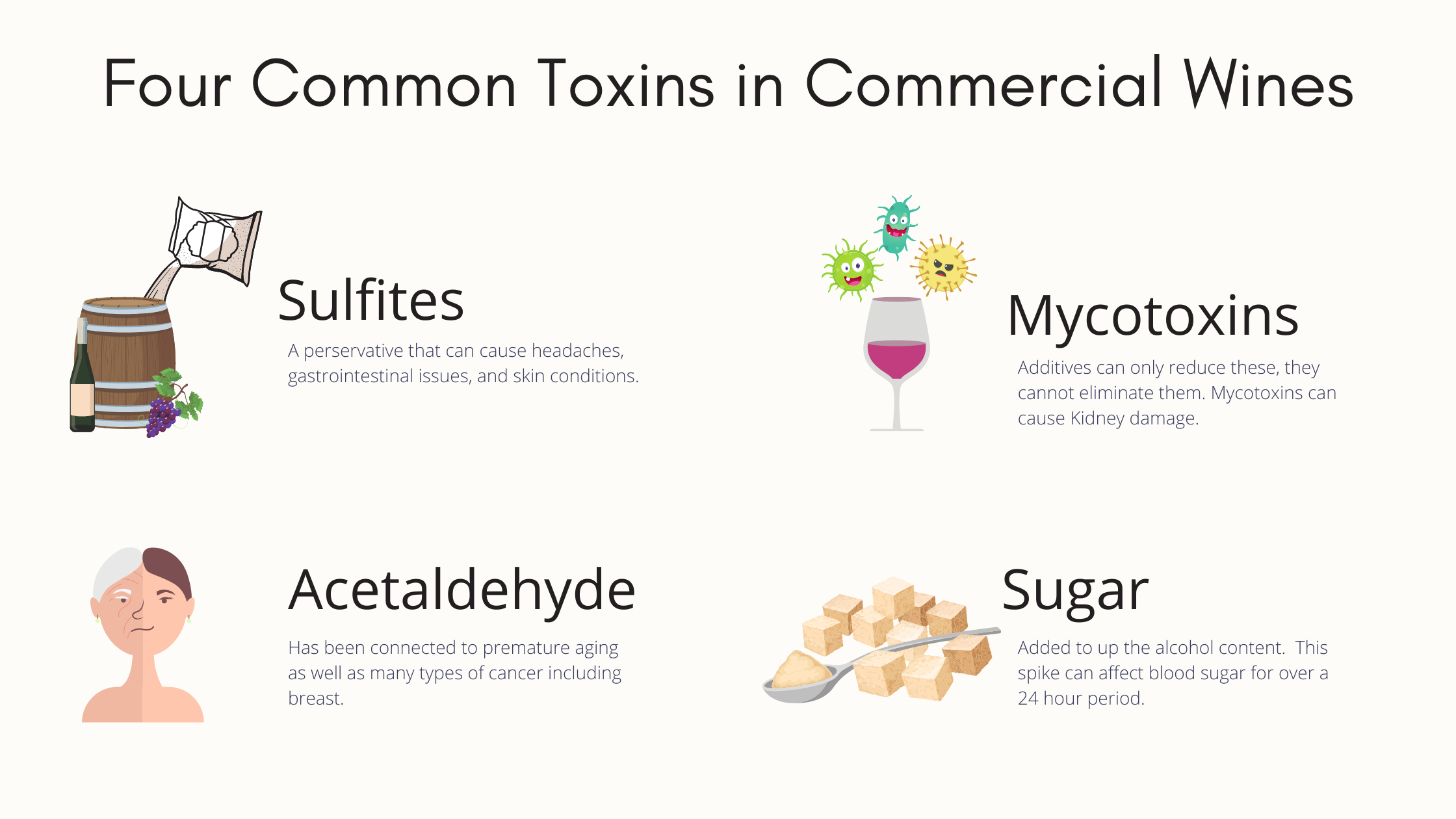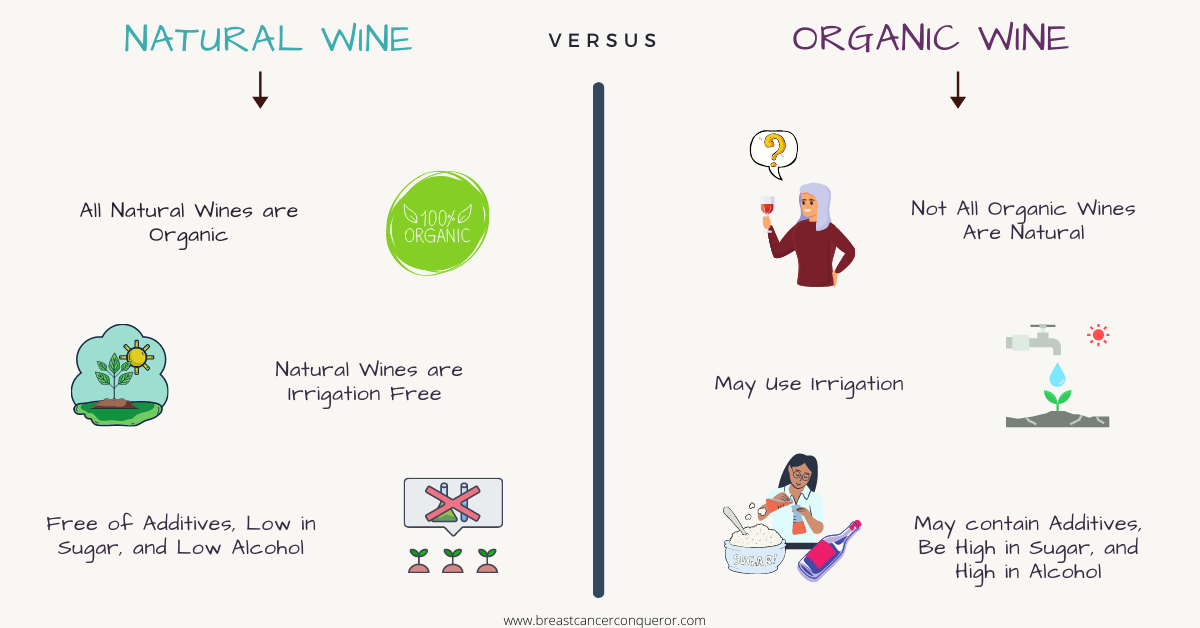As many of you know, I will never get on the “one glass a day [1]” bandwagon when it comes to wine. That being said, since I am French, I do appreciate a great red wine every once in a while! That was why during my second healing journey with Breast Cancer, I took a “deep dive” into the topic. I discovered the huge difference between “naturally produced” wines and commercial ones. This is when I connected with an amazing company called Dry Farm Wines. Dry Farm Wines is helping to spread the word about naturally-produced, small-batch wines, that are good for you, good for the earth, and taste absolutely delicious!
What is Wrong with Commercial Wines?
We probably all know that red wine in moderation [2] may be beneficial on the Healthy Breast journey. This is because the resveratrol found in wine grapes is a very powerful antioxidant that has the ability to inhibit Breast Cancer stem cells [3].
Unfortunately, the side effects of commercial wine often outweigh the benefits. Many of the toxics in commercial wines come in the form of additives. According to Todd White [4], founder of Dry Farm Wines, there are currently 74 different US FDA-approved additives [5] that can go into a bottle of commercial wine. Some of these are natural substances, but many of them are chemicals that can have both short and long-term health effects.
In an amazing and highly-informative interview I did with him recently, Todd explained the “dark side” of the wine industry. Like most things in commercial agriculture, the practices of commercial operations are influenced by money.
“When you go to the grocery store or a bottle shop and you see those rows and rows of bottles. Most of those are made by a handful of companies,” Todd explains in the interview. “These multibillion-dollar conglomerates don’t want you to know that. So they hide behind thousands of brands and labels to confuse you. They will have a picture of a farmhouse on the label to have you believe that you are drinking from a farmhouse. When really, more than likely, you are drinking from a massive wine factory located in the central valley of California.”
Currently, says Todd, 52% of all commercial wines in the U.S. are made by just three companies. The top 30 companies make over 70% of all U.S. wines.
I highly recommend checking out my interview with Todd to learn more HERE! [4]
Four Common Toxins in Commercial Wines

Here are just a few of the toxic substances found within commercial wines that you need to stay away from on your Healthy Breast journey [6]:
#1 Sulfites.
Let’s start with the one that can have immediate effects on most people. Any fermented food, such as cultured vegetables, yogurt, and wine, will have some naturally-occurring sulfites. The sulfite content [7] we are talking about here, however, is higher than normal. This is because commercial operations will add additional sulfur dioxide and other sulfites to the mix in order to preserve and sterilize it.
These preservatives are not healthy for anyone. People with autoimmune conditions [8], especially asthma, often have a particularly hard time ingesting them, however. Additional sulfites can cause headaches, skin conditions, gastrointestinal issues, brain fog, and more.
#2 Mycotoxins.
According to a 2015 study [9] done by the University of Perugia in Italy, mycotoxins represent one of the highest risks for public safety within food commodities worldwide.
Additives found in commercial wines help to prevent mycotoxins from taking hold within wine bottles. Most of the time, however, they do not get rid of all of them.
The most common mycotoxin found in commercial red wine is Ochratoxin A [10]. Ochratoxin A is produced by different species of Aspergillus and Penicillium. This can be especially damaging to the kidneys. A 2017 study [11] published in the journal Toxins found a high incidence of Ochratoxin A in wine sourced from the United States.
#3 Acetaldehyde.
Acetaldehyde is a stabilizer in wine. The U.S. Environmental Protection Agency (EPA) [12] has deemed it a Group B2 “Possible Human Carcinogen.” Studies [13] have connected acetaldehyde to premature aging and many kinds of cancer, including Breast Cancer.
The ethanol (alcohol) in wine is broken down to acetaldehyde by the liver, so you get an added dose of this cancer causing substance.
#4 Sugar.
Commercial operations often add additional sugar to their batches in order to up the alcohol content. These wines have enough sugar in them to be a concern for anyone on a Healing Journey with Breast Cancer [14]. A single glass of commercial wine holds enough simple carbs to significantly spike blood sugar over a 24 hour period, according to the ADA (American Diabetes Association).
Of course, sugar is not just a concern for diabetics. There is a direct correlation between sugar and cancer since cancer cells “feed” (i.e. get the energy to grow) from glucose molecules. To learn more about sugar and cancer, be sure to read this article [15].
Other toxins found in commercial wines include Dimenthyl Dicarbonate (DMDC), Sodium Metabisulfite [16] (a type of sulfite), glyphosate, a dangerous pesticide used in grape growing, and many others.
Organic vs. Natural Wines
“All-natural wines are organic but not all organic wines are natural,” says Todd White of Dry Farm Wines [17]. Translation: just because a wine says “organic [18]” on the label does not mean it is additive-free, low sugar, irrigation free, and low alcohol.
Natural wines, on the other hand, come from small farms mostly run by families. Todd calls this “farming with love.”
“Farming with love is about nurturing care towards living soils. The soil and the health of the soil are really going to determine the quality of what is grown in it,” says Todd. “When you go into a natural wine farm, you will have orchards and livestock and you will have bees and olive orchards and fruit orchards…[I]t’s a whole living organism.”

Dry Farm Wines: The Strictest Standards in the Natural Wine Industry
I discovered Dry Farm Wines when I met Todd White at a conference many years back and was immediately fascinated by his operation. I was further impressed by the standards that all of the wines within his distribution network must pass.
The natural wine industry and movement maintain “unofficial standards [19]” that they all agree to adhere to. Dry Farm Wines [17], however, has really raised the bar on these to set the standard for excellence. They have put into place quantifiable measurements and lab test wine samples every step of the way. This ensures that they can bring science-based, high-quality, and safe wines to their customers that also taste great!
Every bottle that is shipped to customers:
-is biodynamic or organically-grown;
-is grown using irrigation-free means (also known as “dry farming”, which preserved both the nutritional content and the taste of the wine);
-is fermented with native wild-grown yeast;
-contains no additives nor manipulations;
-is sugar-free;
-contains very low alcohol content (12.5% or less);
-tastes delicious!
All of the wines that pass through Dry Farm Wines are clearly labeled. Not only with sugar and alcohol content but also other nutritional information and organic certification seals as well.
Enjoy Your Red Guilt-Free with These Promos!
Since I first met him, Todd’s company has grown. Dry Farm Wines is now the largest natural wine distributor in the U.S. The company works with over 700 small farm operations, all of which are located outside of the U.S. (mostly in Europe and Latin America).
If you are curious in tasting and trying this clean wine, you can get an extra bottle of wine for 1 penny [20] on your first subscription.
I really believe in what Todd and Dry Farm Wines is doing. They bring super high-quality products and education to people about wine and alcohol consumption in general. I love Todd’s philosophy about wine: “Drinking wine should be about “tuning in” not just “checking out.”” With Dry Farm Wines, now you can do just that!
